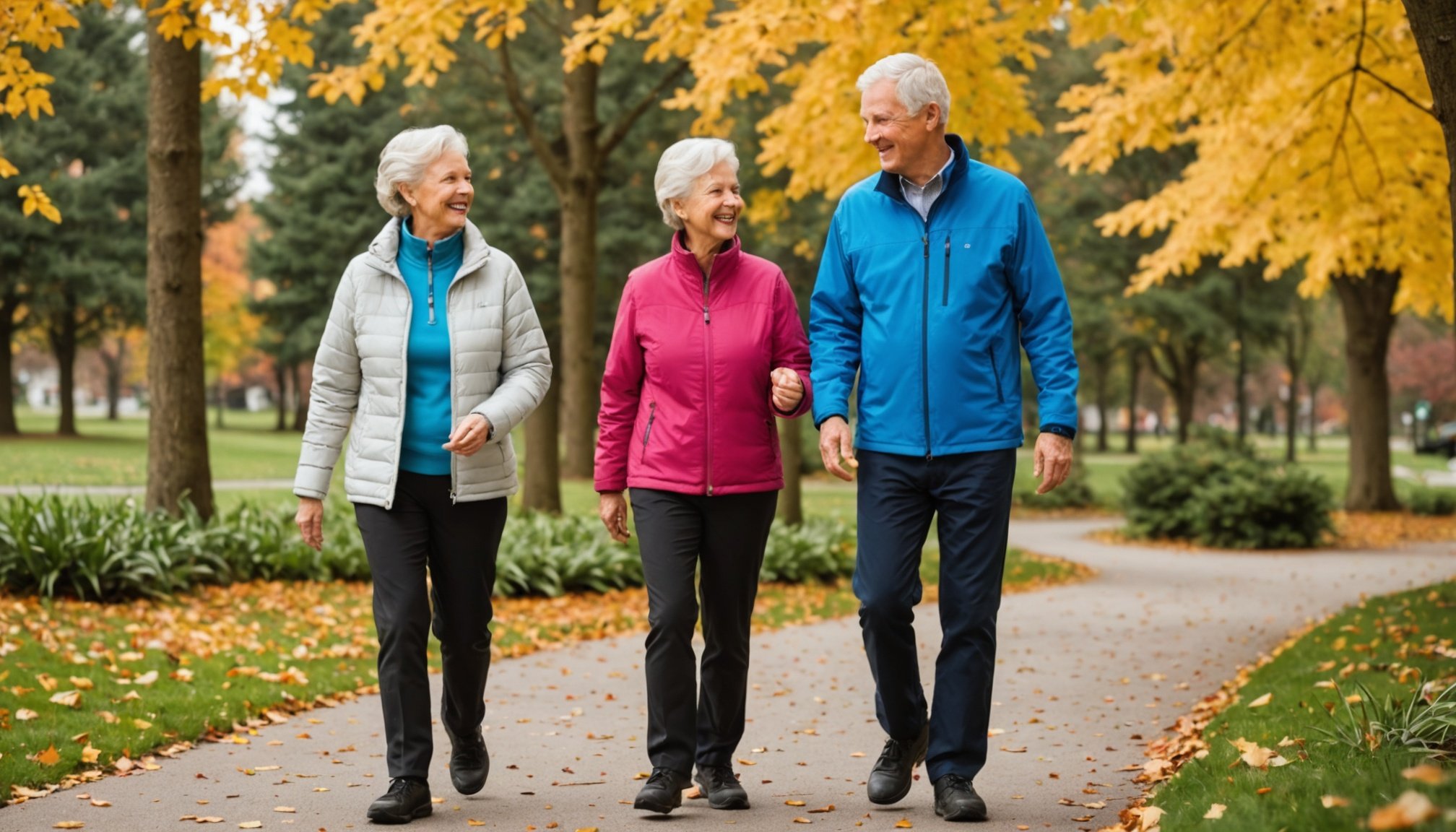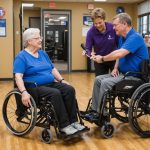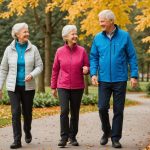Winter Fitness Activities for Seniors
Staying active during winter is crucial for maintaining a healthy lifestyle, especially for seniors. Regular exercise not only supports physical health but can also improve mood during the shorter daylight months. With the chilly season upon us, embracing a diverse range of winter fitness activities can keep seniors engaged and motivated.
Low-impact exercises are ideal in colder months. Options like indoor swimming, gentle yoga, or tai chi offer movement with minimal strain on joints. These activities emphasize flexibility and strength without putting undue stress on the body. For those keen to enjoy the crisp winter air, walking with proper footing ensures safe outdoor exercise.
Also to read : Key Features to Consider When Choosing Adaptive Clothing for Seniors: A Comprehensive Guide
Winter sports can provide excitement and vigor to the routine. Cross-country skiing or snowshoeing not only gets the heart pumping but also allows for scenic enjoyment of winter landscapes. Seniors should choose activities suitable for their fitness level and consider joining groups or clubs to foster social connections.
A well-rounded fitness routine, combining both indoor exercises and outdoor activities, ensures the comprehensive physical engagement necessary for sustained health. Adapting to winter conditions while staying active aids seniors in maintaining an active lifestyle all year round.
In parallel : Top Strategies for Seniors: Mastering Chronic Pain Management
Safety Tips for Exercising in Cold Weather
Engaging in winter fitness is advantageous but requires winter safety precautions to protect seniors. Dressing appropriately is pivotal; layers trap heat while allowing mobility during senior exercise. Always choose moisture-wicking fabrics closest to the skin to manage sweat efficiently, ensuring warmth isn’t compromised.
It’s vital to grasp potential risks associated with cold weather activities. Reduced temperatures can lead to hypothermia and frostbite if exposure is without sufficient protection. Keeping an eye on weather updates and wind chill factors ensures safer planning of outdoor exercises, underpinning senior exercise safety.
Cold weather tips extend to senior safety in indoor environments. Ensure indoor spaces are well-ventilated and temperature-controlled. This creates a conducive exercise environment, preventing overheating or discomfort from overheated rooms. While vivid outdoor snow scenes allure, indoor setups using mats or stationary equipment offer controlled, safe surroundings without cold weather constraints.
Adopting these precautions not only supports an active lifestyle but elevates the confidence of seniors to participate. Circumventing the cold weather’s negative impacts stimulates continuous, joyful engagement in both indoor and outdoor exercises, preserving well-being and fostering a balanced routine. By understanding these simple adjustments, winter becomes a backdrop for rich, secure physical activity.
Indoor Activity Recommendations
Focusing on indoor activities can be both enjoyable and beneficial for senior engagement during cold winter months. Participating in activities such as dance classes, stretching routines, or light cardio like indoor cycling can enhance flexibility and overall fitness. These pastimes not only promote physical activity but also offer variety in a winter routine.
Winter hobbies like knitting, crafting, or indoor gardening incorporate gentle movements that keep seniors engaged and help maintain motor skills. Additionally, they provide an excellent opportunity for creativity and relaxation.
Group classes or social workouts offer both physical benefits and essential social interaction, which is significant for mental health. Engaging in these classes can create a supportive community, making exercise a regular, enjoyable part of daily life.
For those comfortable with technology, numerous online resources and virtual fitness programs can be explored. These resources offer flexibility in accessing workouts any time, allowing seniors to exercise at their own pace and in the comfort of their homes. With an abundance of choices available, finding a program that excites and motivates is key to maintaining momentum throughout the winter season, fostering continued movement, and ensuring well-rounded fitness and mental well-being.
Outdoor Activities for Seniors
Participating in outdoor activities during winter offers several health benefits for seniors. Winter walking is an effective way to enjoy nature and maintain fitness. Engaging in nature not only promotes physical health but also enhances mental well-being. Whether through local parks or nearby trails, breathing fresh air and soaking up daylight can boost mood and energy levels.
Ensuring safety is paramount when exploring winter landscapes. Seniors should wear appropriate footwear designed with reliable traction to prevent slips and falls. Using walking poles can provide extra stability, enhancing confidence while traversing icy paths. Carrying a mobile phone and letting someone know the planned route can also ensure a safe outdoor experience.
Local parks often host programs specially tailored for seniors, such as guided winter nature walks or bird watching events. These community activities foster a sense of belonging while encouraging physical activity. Checking with local senior centers can provide information on upcoming events, helping seniors stay active and socially engaged during the cold months.
Embracing outdoor activities not only helps maintain an active lifestyle but also offers opportunities to connect with others. Consistent participation in these programs benefits both physical and psychological health, reinforcing the joys and benefits of spending time outdoors in winter.
Community Resources and Programs
Incorporating community engagement into an active lifestyle is vital for seniors during winter. Many local community centers offer a variety of senior programs designed to keep those over 65 active and socially connected. Participating in these programs fosters not only physical activity but also mental well-being through meaningful interactions.
Community centers typically provide activities such as tai chi, dance classes, and book clubs. These activities encourage both movement and socialization, supporting holistic health. Moreover, they are often tailored to cater to different abilities, ensuring accessibility for all seniors.
Keeping active through these programs offers numerous benefits. It nurtures social ties and combats loneliness by allowing seniors to make new friends. Additionally, engaging in structured activities with peers can bolster motivation and commitment to regular exercise routines.
To connect with these resources, seniors can explore local libraries, senior centers, or online community boards where programs are frequently advertised. Engaging with these platforms provides an opportunity to learn about available classes and special events, thus enriching both physical and emotional health.
By utilizing local resources, seniors can maintain a balanced lifestyle. Regular participation in community activities encourages a sense of belonging and purpose, key factors in promoting overall well-being during winter months.
Nutritional Advice to Boost Energy
Maintaining a solid level of senior nutrition is essential for keeping up with winter activities. Opting for a balanced winter diet can ensure energy is sustained throughout the colder months, supporting overall well-being.
Incorporating energy-boosting foods like whole grains, lean proteins, and healthy fats plays a pivotal role. These nourish the body while providing long-lasting energy. Including fruits like bananas or oranges, rich in essential vitamins, can enhance vitality. Vegetables, particularly dark leafy greens, are vital in reinforcing immune function during winter.
Eating regular meals and snacks is important to prevent fatigue and maintain energy. Focusing on foods such as oatmeal or quinoa, which release energy slowly, can support enduring stamina. Additionally, integrating omega-3-rich foods like salmon or flaxseeds boosts brain health, especially important for mental focus and clarity.
Adequate hydration is also crucial during winter. Despite cooler temperatures, staying hydrated helps the body function optimally. Seniors should aim to drink water consistently throughout the day. Herbal teas or warm soups can also contribute to fluid intake, providing a comforting way to stay hydrated. Maintaining balanced nutrition optimises energy levels and supports an active lifestyle during winter.











